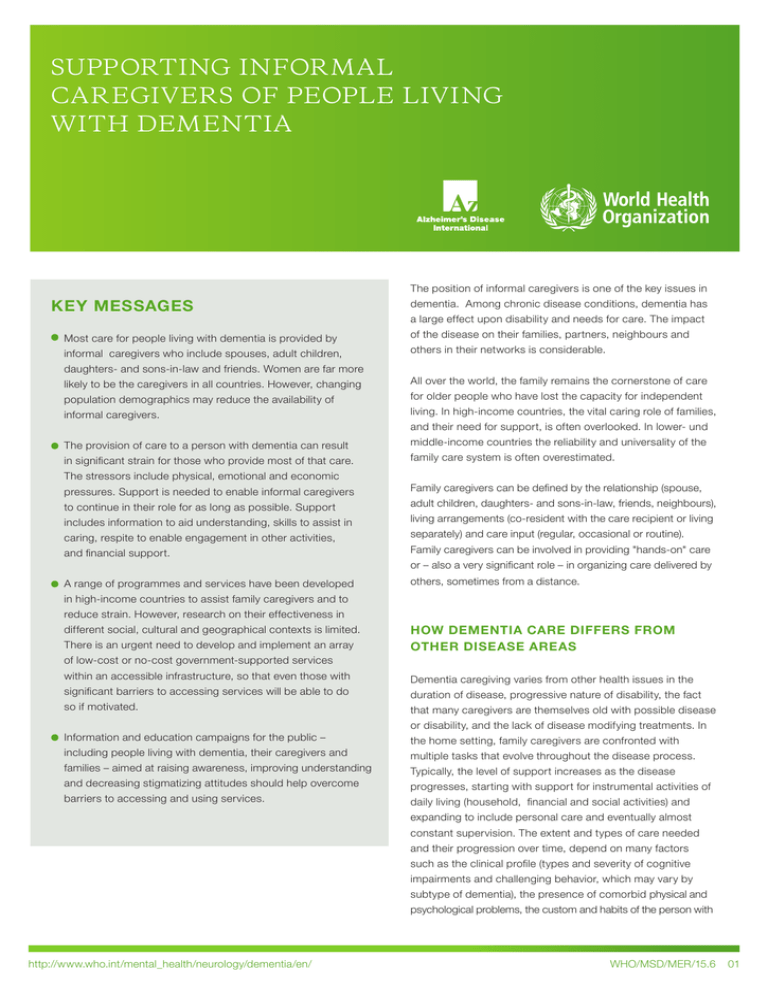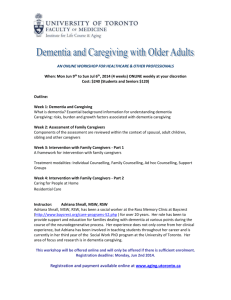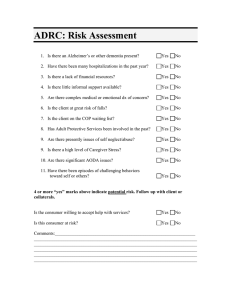
SUPPORTING INFORMAL
CAREGIVERS OF PEOPLE LIVING
WITH DEMENTIA
KEY MESSAGES
Most care for people living with dementia is provided by
informal caregivers who include spouses, adult children,
daughters- and sons-in-law and friends. Women are far more
likely to be the caregivers in all countries. However, changing
population demographics may reduce the availability of
informal caregivers.
The provision of care to a person with dementia can result
in significant strain for those who provide most of that care.
The stressors include physical, emotional and economic
pressures. Support is needed to enable informal caregivers
to continue in their role for as long as possible. Support
includes information to aid understanding, skills to assist in
caring, respite to enable engagement in other activities,
and financial support.
A range of programmes and services have been developed
The position of informal caregivers is one of the key issues in
dementia. Among chronic disease conditions, dementia has
a large effect upon disability and needs for care. The impact
of the disease on their families, partners, neighbours and
others in their networks is considerable.
All over the world, the family remains the cornerstone of care
for older people who have lost the capacity for independent
living. In high-income countries, the vital caring role of families,
and their need for support, is often overlooked. In lower- und
middle-income countries the reliability and universality of the
family care system is often overestimated.
Family caregivers can be defined by the relationship (spouse,
adult children, daughters- and sons-in-law, friends, neighbours),
living arrangements (co-resident with the care recipient or living
separately) and care input (regular, occasional or routine).
Family caregivers can be involved in providing "hands-on" care
or – also a very significant role – in organizing care delivered by
others, sometimes from a distance.
in high-income countries to assist family caregivers and to
reduce strain. However, research on their effectiveness in
different social, cultural and geographical contexts is limited.
There is an urgent need to develop and implement an array
HOW DEMENTIA CARE DIFFERS FROM
OTHER DISEASE AREAS
of low-cost or no-cost government-supported services
within an accessible infrastructure, so that even those with
Dementia caregiving varies from other health issues in the
significant barriers to accessing services will be able to do
duration of disease, progressive nature of disability, the fact
so if motivated.
that many caregivers are themselves old with possible disease
or disability, and the lack of disease modifying treatments. In
Information and education campaigns for the public –
the home setting, family caregivers are confronted with
including people living with dementia, their caregivers and
multiple tasks that evolve throughout the disease process.
families – aimed at raising awareness, improving understanding
Typically, the level of support increases as the disease
and decreasing stigmatizing attitudes should help overcome
progresses, starting with support for instrumental activities of
barriers to accessing and using services.
daily living (household, financial and social activities) and
expanding to include personal care and eventually almost
constant supervision. The extent and types of care needed
and their progression over time, depend on many factors
such as the clinical profile (types and severity of cognitive
impairments and challenging behavior, which may vary by
subtype of dementia), the presence of comorbid physical and
psychological problems, the custom and habits of the person with
http://www.who.int/mental_health/neurology/dementia/en/
WHO/MSD/MER/15.6
01
SUPPORTING INFORMAL
CAREGIVERS OF PEOPLE LIVING
WITH DEMENTIA
dementia, the person’s personality and significant relationships.
dementia; it should also be a concern for communities,
Symptomatic features of dementia will vary considerably from person
governments and society as a whole. However, the role of family
to person within and between the different diseases that result in
caregivers is often neither supported nor properly acknowledged.
dementia, and the caregiver’s role will vary accordingly.
Dementia care is difficult and requires time, energy and, often,
HEALTH AND ECONOMIC IMPACT
physical exertion from the caregiver. As the disease progresses
slowly, family members often provide care for many years and are
Family caregivers of people living with dementia are more likely to
under high levels of stress for long periods of time. The effects of
develop major depression, anxiety disorders, and physical health
high stress levels are intensified by the chronic fatigue associated
disorders among others and they have a higher mortality rate
with providing long hours of care without periods of relief.
compared to the general population. Providing dementia care
can become a full-time job without adequate support. Caregivers
The majority of family caregivers are women, according to this
may be forced to quit work, cut back on work, or take less
study in several lower- and middle-income countries (Table 1).
demanding jobs in order to provide care.
In the United States of America in 2010, nearly 15 million family
CAREGIVING IS A SOCIAL ISSUE
and other informal caregivers provided an estimated 17 billion
hours of care to people living with dementia, a contribution
Caregiving and support is not the responsibility solely of the
valued at more than US$ 202 billion (Alzheimer’ Association,
family and others in the immediate network of the person with
Facts and figures 2011).
11 / 6 6
dementia
research
group
study site
Number
Cuba
Household living arrangements
Characteristics of the main caregiver
Alone (%)
Spouse
only (%)
Adult
children (%)
One or more
children
under age
16 (%)
Spouse (%)
Child or
child-in-law
(%)
Non-relative
(%)
Female
caregiver
(%)
316
6.3
10.2
54.7
33.7
17.3
67.7
5.8
80.0
Dominican
Republic
235
8.5
10.2
48.5
39.9
21.4
44.6
11.6
81.3
Venezuela
140
5.7
4.9
68.1
53.8
13.7
68.4
2.8
80.7
Peru (urban)
129
1.6
9.4
54.3
27.1
13.0
41.6
30.1
83.7
Peru (rural)
36
13.9
8.3
63.9
38.9
16.7
58.4
2.8
86.1
Mexico (urban)
86
14.0
9.3
55.8
38.4
5.8
79.1
3.5
83.7
Mexico (rural)
85
16.5
11.1
55.3
31.8
12.9
68.2
2.4
76.5
China (urban)
81
2.5
34.5
38.3
7.4
36.1
47.3
13.9
66.7
China (rural)
56
3.6
8.9
75.0
60.7
42.9
57.1
0
35.7
India (urban)
75
4.0
13.3
72.0
49.2
26.7
40.0
0
69.3
India (rural)
10
15.1
5.7
67.0
52.8
23.3
70.0
0
80.2
TABLE 1 Household living arrangements and characteristics of the main caregiver for people with dementia at 11 sites in Latin
America, China and India. Source: World Alzheimer Report 2009, table 2.3, p. 55
http://www.who.int/mental_health/neurology/dementia/en/
WHO/MSD/MER/15.6
02
SUPPORTING INFORMAL
CAREGIVERS OF PEOPLE LIVING
WITH DEMENTIA
The global economic impact of caregiving for dementia has been
WHO region
(green = imputed)
Basic
ADL
Combined
ADL
Supervision
Australasia
2.0
3.3
2.6
literature, for the World Alzheimer Report 2010. A summary on
Asia Pacific, High-Income
2.0
3.6
2.6
informal care inputs (hours per day) is presented in Table 2.
Oceania
3.6
4.6
1.2
Asia, Central
1.2
2.7
3.3
Asia, East
3.6
4.7
1.2
Asia, South
1.3
2.7
2.6
Asia, South-East
1.3
2.7
2.6
Europe, Western
1.1
3.5
3.3
Europe, Central
2.1
4.4
3.4
Europe, Eastern
2.1
4.4
3.4
North America, High-Income
2.1
4.0
2.8
Caribbean
3.0
3.0
2.1
Latin America, Andean
2.9
2.9
2.6
Latin America, Central
1.9
1.9
3.1
Latin America, Southern
2.9
4.4
2.6
Latin America, Tropical
2.9
2.9
2.6
North Africa / Middle East
1.0
1.4
2.8
The barriers to accessing caregiver support services are the same
Sub-Saharan Africa, Central
2.0
3.6
2.6
as those identified for accessing dementia-appropriate health and
Sub-Saharan Africa, East
2.0
3.6
2.6
social services in general. These barriers include negative attitudes
Sub-Saharan Africa,
Southern
2.0
3.6
2.6
Sub-Saharan Africa, West
2.0
3.6
2.6
All
2.0
3.6
2.6
estimated in detail, based on a systematic review of the world
TABLE 2 WHO-region specific figures of informal care inputs
(hours per day)
Where estimates were not available for a particular world region
they were imputed from findings from a neighboring region with
similar characteristics. The caregiver time was quantified as:
assistance with basic Activities of Daily Living (ADL), such as
eating, dressing, bathing, toileting, grooming, and getting
around (sometimes referred to as personal care);
assistance with combined ADL, including also Instrumental
Activities of Daily Living (IADL), such as shopping, preparing
food, using transport, and managing personal finances;
supervision to manage behavioral symptoms or to prevent
dangerous events.
BARRIERS TO ACCESSING CAREGIVER
SUPPORT SERVICES
to diagnosis and treatment, lack of appropriately trained health
workforce and of the infrastructure to scale up services, low help
seeking due to dementia being considered part of ageing or stigma,
lack of public policy initiatives, and lack of funds for dementia
services, research, and training.
Caregivers also face additional barriers when seeking services
for themselves. In many low- and middle-income countries,
no support services are routinely available for family caregivers.
Even in high-income countries there are barriers to access and
COST OF CARE
The 2010 World Alzheimer’s report estimated the total cost of
Alzheimer’s care worldwide at US$ 604 billion, of which the costs
uptake, including lack of recognition of the caregiving role, poor
understanding of dementia, and cultural influences on caregiving,
such as taking for granted that this will be done by the family
and especially by female family members.
of informal care (unpaid care provided by families and others) and
the direct costs of social care (provided by community care
professionals and in residential home settings) contribute similar
proportions (42%) of total costs worldwide, while direct medical
care costs are much lower (16%) (1).
http://www.who.int/mental_health/neurology/dementia/en/
WHO/MSD/MER/15.6
03
SUPPORTING INFORMAL
CAREGIVERS OF PEOPLE LIVING
WITH DEMENTIA
STRENGTHENING CAREGIVERS
In addition, several caregiver interventions have been found
Strengthening caregivers requires provision of information
reduced caregiver strain and psychiatric morbidity among
resources and training, support and respite, and financial support.
Information, resources and training: Information needs to
include understanding the characteristics and course of the
disease and what resources are available to families, along
with training in how to care for people with the disease and
how to prevent and deal with challenging behavior.
Support and respite: There are a number of strategies for
effective through rigorous evaluation. Outcomes included
caregivers. Innovative technology might play a role in the
development of caregiver interventions. At present, the World
Health Organization (WHO) is working on iSupport (Box 1), an
information and communication technology based platform for
caregivers that will be developed in multiple languages. Lastly,
programs such as the mhGAP intervention guide highlight the
role of health care providers to acknowledge and support the
caregiver role while dealing with a person with dementia in their
clinical practice.
supporting caregivers, including counselling and long-term
support, caregiver retreats, respite care and family meetings
that include the person with dementia. It is urgent to
implement strategies that are successful and replicable,
focusing on both best practices and promising ones.
Financial support: Caregivers need financial assistance
BOX 1. iSUPPORT: AN E-HEALTH
SOLUTION TO SUPPORT CAREGIVERS AND
PEOPLE WITH DEMENTIA
WHO has partnered up with international
in order to be able to provide appropriate care and to continue
experts in caregiving and dementia to
the caregiver role in the long term. A few models are in place
develop a comprehensive, online education
worldwide such as the long-term care insurance in Japan.
portal called "iSupport". The portal is aimed at
Some other countries like Germany provide caregiver benefits.
relieving the burden of caregiving by emphasizing self-help,
In addition to caregiver benefits, disability benefits for the person
skills training and support for caregivers of people living
with dementia and social pensions also have a part to play.
with dementia. iSupport will be made available via a secured
internet connection on personal computers, tablets and
smart phones.
Strengthening caregivers is needed. National and subnational
dementia plans from various countries make this point over and
over again. Even though the specifics may vary by income level
of a country, the theme remains the same. In Scotland this is
taking the form of a guarantee of one-year of post-diagnostic
support for the person with the dementia diagnosis and their
family, while in Finland it is taking the form of creating information
centers for caregivers of people living with dementia at the
municipal level all over the country. In Mauritius, the care strategy
References
1.World Health Organization. Dementia: a public health priority. Geneva: World Health
Organization; 2012.
Acknowledgements
This thematic briefing was prepared for the First WHO Ministerial Conference on the
Global Action against Dementia.
includes basic training to informal caregivers, a feature we see all
over the world.
© World Health Organization 2015
All rights reserved. This thematic briefing of the World Health Organization is available on
the WHO website (http://www.who.int/mental_health/neurology/dementia/en/). Requests
for permission to reproduce or translate this thematic briefing –whether for sale or for noncommercial distribution– should be addressed to whodementia@who.int. This publication
does not necessarily represent the decisions or the policies of the World Health
Organization.
Design by: Erica Lefstad
http://www.who.int/mental_health/neurology/dementia/en/
WHO/MSD/MER/15.6
04



